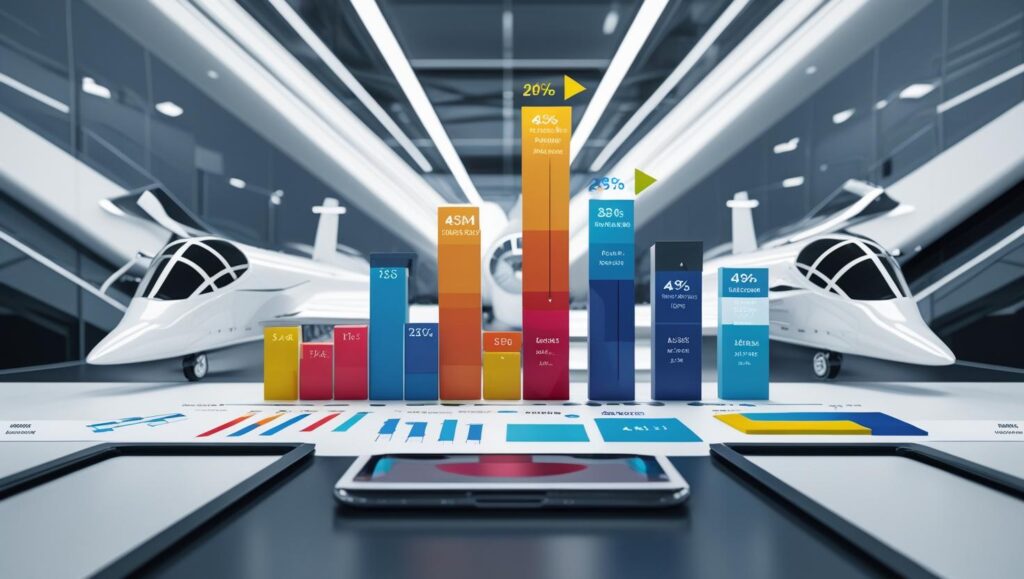The global aerospace testing industry has been experiencing significant growth over the past decade, driven by an increasing demand for commercial and defense aircraft. This surge in aircraft manufacturing has directly impacted the aerospace testing market, creating new opportunities for service providers and technology developers alike. Aerospace testing, a critical component in ensuring safety, reliability, and compliance, has become a focal point as manufacturers seek to meet rigorous international standards.
Rising Aircraft Manufacturing: A Key Growth Driver
The expansion of global air travel, coupled with increasing defense and space program investments, has led to an unprecedented rise in aircraft production. According to industry reports, manufacturers are producing hundreds of new aircraft annually, both for commercial airlines and military purposes. This boom necessitates comprehensive testing at every stage—from raw materials and components to fully assembled aircraft—ensuring that each unit meets stringent safety and performance standards.
The surge in manufacturing has also prompted investments in modern testing technologies. Companies are deploying advanced tools such as non-destructive testing (NDT), automated inspection systems, and simulation-based testing to enhance efficiency and accuracy. These technologies reduce testing time and costs while maintaining compliance with safety regulations, making them essential in a high-volume production environment.
Download PDF Brochure @ https://www.marketsandmarkets.com/pdfdownloadNew.asp?id=32924426

Technological Advancements in Aerospace Testing
The aerospace testing market is being reshaped by rapid technological innovation. Digital tools, including virtual testing, digital twins, and AI-driven predictive maintenance, are transforming traditional approaches. These innovations allow manufacturers to detect potential defects early, optimize component performance, and simulate operational scenarios that would be difficult or risky to recreate physically.
Automation is another critical trend. Robotic inspection systems and sensor-based monitoring enable faster, more precise evaluations, minimizing human error and increasing throughput. As aircraft designs become more complex with advanced materials like composites and lightweight alloys, sophisticated testing methods are essential to maintain safety and regulatory compliance.
Regional Growth Trends
North America and Europe have historically led the aerospace testing market, supported by established aerospace manufacturing hubs and robust regulatory frameworks. However, the Asia-Pacific region is emerging as a significant growth center, with countries like China, India, and Japan ramping up commercial aircraft production and defense capabilities. This regional expansion is expected to drive global demand for aerospace testing services, creating opportunities for both local and international testing providers.
Challenges and Opportunities
Despite strong growth, the aerospace testing market faces several challenges. High costs associated with advanced testing equipment, skilled workforce shortages, and complex certification processes can limit market accessibility. However, these challenges are accompanied by considerable opportunities. Companies that invest in cutting-edge technologies, streamline testing procedures, and expand into emerging markets are well-positioned to benefit from the ongoing aircraft manufacturing boom.
The rise in aircraft manufacturing is a clear catalyst for the growth of the aerospace testing market. As production volumes increase and aircraft technology evolves, the demand for rigorous, reliable, and efficient testing will continue to grow. With innovations in automation, AI, and digital testing, aerospace manufacturers and testing service providers are poised to meet these demands, ensuring the future of aviation remains safe, sustainable, and technologically advanced.
Aerospace Testing Market – Frequently Asked Questions (FAQ)
1. What is aerospace testing?
Aerospace testing involves evaluating aircraft, components, and materials to ensure they meet safety, performance, and regulatory standards. It includes structural testing, engine testing, avionics validation, non-destructive testing (NDT), and simulation-based testing.
2. Why is aerospace testing important?
Aerospace testing ensures safety, reliability, and regulatory compliance. With aircraft operating under extreme conditions, rigorous testing prevents failures, minimizes risks, and ensures that designs meet global aviation standards.
3. What factors are driving the aerospace testing market?
- Rising aircraft manufacturing for commercial, defense, and space applications.
- Increasing adoption of advanced materials and complex aircraft designs.
- Integration of AI, digital twins, and automated testing systems.
- Growing demand for safety and regulatory compliance in aviation.
4. Which sectors use aerospace testing services?
- Commercial Aviation: Passenger planes and cargo aircraft.
- Defense & Military: Fighter jets, helicopters, and drones.
- Space Industry: Satellites, launch vehicles, and spacecraft.
- Maintenance, Repair, and Overhaul (MRO): Testing aircraft post-production for continued safety.
About MarketsandMarkets™
MarketsandMarkets™ has been recognized as one of America’s Best Management Consulting Firms by Forbes, as per their recent report.
MarketsandMarkets™ is a blue ocean alternative in growth consulting and program management, leveraging a man-machine offering to drive supernormal growth for progressive organizations in the B2B space. With the widest lens on emerging technologies, we are proficient in co-creating supernormal growth for clients across the globe.
Today, 80% of Fortune 2000 companies rely on MarketsandMarkets, and 90 of the top 100 companies in each sector trust us to accelerate their revenue growth. With a global clientele of over 13,000 organizations, we help businesses thrive in a disruptive ecosystem.
The B2B economy is witnessing the emergence of $25 trillion in new revenue streams that are replacing existing ones within this decade. We work with clients on growth programs, helping them monetize this $25 trillion opportunity through our service lines – TAM Expansion, Go-to-Market (GTM) Strategy to Execution, Market Share Gain, Account Enablement, and Thought Leadership Marketing.
Built on the ‘GIVE Growth’ principle, we collaborate with several Forbes Global 2000 B2B companies to keep them future-ready. Our insights and strategies are powered by industry experts, cutting-edge AI, and our Market Intelligence Cloud, KnowledgeStore™, which integrates research and provides ecosystem-wide visibility into revenue shifts.
To find out more, visit www.MarketsandMarkets™.com or follow us on Twitter , LinkedIn and Facebook .
Contact:
Mr. Rohan Salgarkar
MarketsandMarkets™ INC.
1615 South Congress Ave.
Suite 103, Delray Beach, FL 33445
USA: +1-888-600-6441